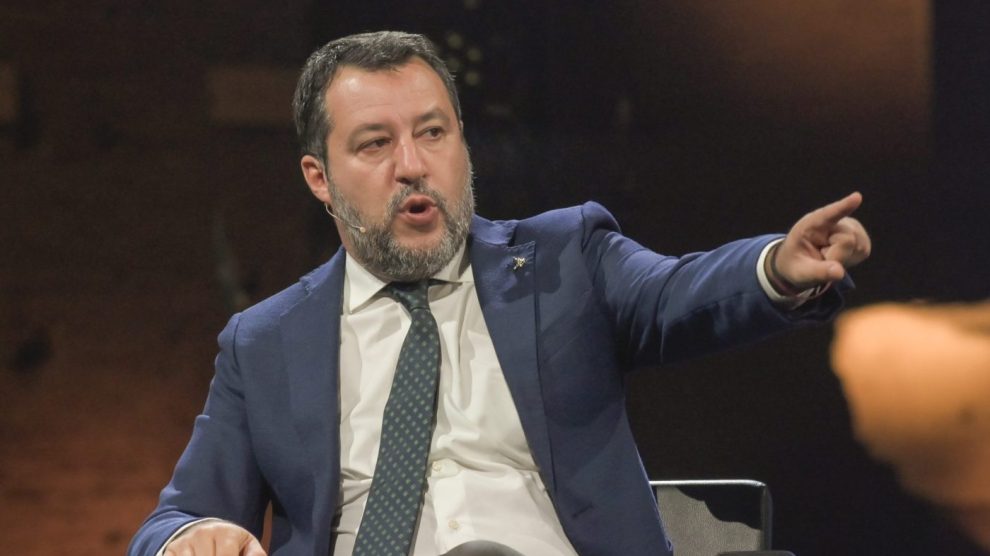Rome increases security against extremists. Over the past few weeks, the Israeli-Hamas conflict has inspired a few episodes of jihadist violence in France and Belgium and raised the spectre of European terrorism once again. In response, several EU countries are increasing security measures. That includes Italy, which on Wednesday resumed border checks along the border with Slovakia – a country linked to the Balkan migration route.
- On Wednesday, Prime Minister Giorgia Meloni said the “worsening situation in the Middle East and the increase in migratory flows” along that route made it necessary to suspend Schengen rules of free movement temporarily.
- The Tunisian-born terrorist who killed two Swedish people in Brussels on Monday reportedly entered the EU via Italy.
It’s about domestic security. The border closure does not mean there are any indications of an imminent attack, as Foreign Minister Antonio Tajani explained on Thursday. On the contrary, the beefed-up security measures are intended to prevent potential terrorists from entering Italy through that route. The measure runs parallel to those taken to protect at-risk sites, especially those frequented by Jewish citizens, he added.
- The government is taking more precautions to minimise the risk of jihadist violence. Citing security reasons, Defence Minister Guido Crosetto recently announced that the Armed Forces celebration scheduled on November 4 would be heavily downsized so as to avoid creating the conditions for a deadlier attack on a large group of concentrated people.
Meanwhile, Matteo Salvini strikes anti-Islam chord. Meanwhile, the deputy PM and leader of the League (a major governing party) has taken the opposite path. On Wednesday, he called for a mass demonstration “to defend the West” in Milan on November 4, the same day as the subdued institutional events. It will be a rally in the name of Oriana Fallaci, he said, citing an influential journalist and author who was among the most critical voices of Islam (especially after the 9/11 attacks in New York City, where she lived at the time).
- This stance is a legacy of Deputy PM Salvini’s populist political history, one of the elements that brought his League to the height of over 34% of votes at the 2019 European elections (and back down to 9% at the 2022 governmental elections).
- As such, and in view of the next European elections in the spring of 2024, there is an element of political calculus in this move: Mr Salvini is likely seeking political dividends by campaigning against Islam (and adopting a harder stance than his coalition allies) at this very delicate junction.
Not in our name. Mr Salvini’s actions were met with contempt from his governing partners, PM Meloni and FM Tajani, whose parties – Brothers of Italy (FdI) and Forza Italia (FI) – will not take part in the demonstration, as they immediately made known. “We’re a governing party,” quipped the latter, while Minister Crosetto, who co-founded FdI with PM Meloni, noted that one jihadist is all it takes in a context of heightened ideological opposition.
- “Some countries want the ideological clash between the West and Islam, but we must stop this. There are also many countries representing moderate Islam with whom we must ally to not make this thing fester and cause uncontrollable problems in the coming years,” he added.
- Even Interior Minister Matteo Piantedosi, who was Mr Salvini’s right-hand man in a previous government and belongs to his same party, said on Wednesday that eliciting an anti-Islam public event would heighten the risk of incidents.
United in support of Israel. This is all happening against the backdrop of a rare show of political unity in support of the Israeli nation and its people, as well as Jewish people worldwide. Despite fighting over slight differences to score political points, all major parties still stand unequivocally with Israel and against Hamas – and also call for restraint in Israel’s response to the attack, in line with international law. That includes the two major opposition forces, as remarked by Israel’s ambassador to Italy, Alon Bar, in an interview with our sister website.
- The line between justice and revenge should “never be crossed,” said the Democratic Party leader Elly Schlein, echoing words uttered by United States President Joe Biden during his visit to Israel. Calling to leverage diplomatic efforts to “dialogue with Arab countries and isolate Hamas” so as to prevent the conflict from spreading (which is the government’s line), she expressed appreciation for FM Tajani’s push to pursue a “two people, two States” solution.
- The M5S “condemned Hamas’ attack without ifs and buts,” remarked the Five Star Movement’s Giuseppe Conte. “But we have also immediately clarified that Israel’s reaction, although it has the right to defend itself, cannot trample the rules of international humanitarian law.” He, too, called to leverage Italy’s diplomatic network to foster dialogue and prevent an escalation.





